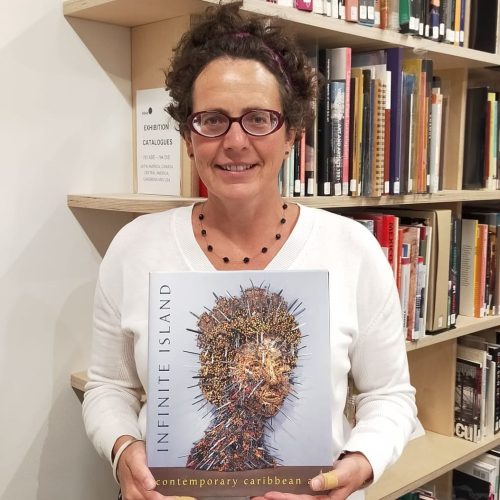
Tessa in the Stuart Hall Library, 2021.
Tessa Roynon reflects on her short placement in the Stuart Hall Library as part of her MA in Library and Information Studies course at University College London and its impact on her current endeavour to create a diverse school library collection.
I was keen to complete a placement at the Stuart Hall Library at iniva for several reasons. First, I have long been a devotee of Stuart Hall’s thought on identity, culture and politics. Second, one of my aims in starting a new library from scratch at The Swan School, where around 46% of students are not white British, is to create a facility that is always and already decolonial, and/or that is anti-racist from its inception. My MA dissertation will focus on whether or not such an ambition can be realised. The Stuart Hall Library and its manager, Tavian Hunter, are currently in the vanguard of anti-racist work in UK Libraries, and although both their collection and their users are in many ways different from that of a secondary school, I hoped to learn from their best practice.
I was not disappointed! I was amazed by how many activities and processes I could participate in or shadow over the 2.5 days of my placement: reshelving; book cataloguing; posting about my visit on iniva’s social media; researching for my dissertation from books in the Library’s collection, searching for missing resources, and abstracting individual articles for the online catalogue.
My primary interest was in how classification, cataloguing and the organization of collections on the shelves can promote (or impede) knowledge justice. In observing these processes at the Stuart Hall Library I was struck by one key similarity with my own practice at school, and one key difference.
I was heartened to see that the collections are organized on the shelves in a clear, user-friendly way but one that is a ‘law unto itself’ – the system and the classification marks (for example in the distinction between the Artist Sequence items, beginning AS, and works in the Essays and Theory collection, beginning ESS) has been devised to best serve the aims of the Library and its researchers’ needs. It has been my own instinct at school to adapt the Dewey classification system both in striving towards greater knowledge justice and to maximize discoverability. Tavian pointed out that so long as I keep a clear record and rationale of the system so that my successors and assistants can also use it, this is a valid and worthwhile approach.
In shadowing the processes of book cataloguing and article abstracting from scratch, I observed how at the Stuart Hall Library these are labours of love, of craftsmanship and of commendably time-consuming attention to detail. For it is through bypassing many elements of mechanized, ‘downloadable’ content that the Library maintains its mission and controls its quality. In starting a school library from scratch, on the other hand, it has been imperative to focus on the quantity of books that can be catalogued in a very short period of time. While the more academic titles for sixth form students of course require careful, socially-just and discoverable cataloguing with individualized input, the vast majority of independent readings titles at Key Stages 3 and 4 must simply pass through the conveyor-belt that is automated cataloguing.
I finished my placement feeling enlightened and inspired – both ready for the challenges of the new term at school, and eager to return to the beautifully-curated treasures of this very special Library.
Biography
Tessa Roynon is the founding Librarian at The Swan School, which is a new and diverse comprehensive school in Oxford. She is also completing the MA in Library and Information Studies at UCL. Prior to retraining as a Librarian she worked as an academic, teaching Literature in English at the University of Oxford, and publishing books on African American authors such as Toni Morrison and Ralph Ellison. She is also a co-editor (with Daniel Orrells and Gurminder Bhambra) of the essay collection African Athena: New Agendas (Oxford University Press, 2011), and has just donated a copy of this book to the Stuart Hall Library. Her latest publication is The Classical Tradition in Modern American Fiction (Edinburgh University Press, 2021).